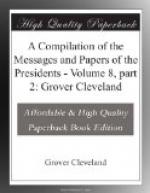The Government of China agrees that the Government of the United States may regulate, limit, or suspend such coming or residence, but may not absolutely prohibit it. The limitation or suspension shall be reasonable, and shall apply only to Chinese who may go to the United States as laborers, other classes not being included in the limitations. Legislation taken in regard to Chinese laborers will be of such a character only as is necessary to enforce the regulation, limitation, or suspension of immigration.
The first section of the act provides that—
From and after the expiration of sixty days next after the passage of this act, and until the expiration of twenty years next after the passage of this act, the coming of Chinese laborers be, and the same is hereby, suspended; and during such suspension it shall not be lawful for any Chinese laborer to come, or, having so come after the expiration of said sixty days, to remain within the United States.
The examination which I have made of the treaty and of the declarations which its negotiators have left on record of the meaning of its language leaves no doubt in my mind that neither contracting party in concluding the treaty of 1880 contemplated the passage of an act prohibiting immigration for twenty years, which is nearly a generation, or thought that such a period would be a reasonable suspension or limitation, or intended to change the provisions of the Burlingame treaty to that extent. I regard this provision of the act as a breach of our national faith, and being unable to bring myself in harmony with the views of Congress on this vital point the honor of the country constrains me to return the act with this objection to its passage.
Deeply convinced of the necessity of some legislation on this subject, and concurring fully with Congress in many of the objects which are sought to be accomplished, I avail myself of the opportunity to point out some other features of the present act which, in my opinion, can be modified to advantage.
The classes of Chinese who still enjoy the protection of the Burlingame treaty are entitled to the privileges, immunities, and exemptions accorded to citizens and subjects of the most favored nation. We have treaties with many powers which permit their citizens and subjects to reside within the United States and carry on business under the same laws and regulations which are enforced against citizens of the United States. I think it may be doubted whether provisions requiring personal registration and the taking out of passports which are not imposed upon natives can be required of Chinese. Without expressing an opinion on that point, I may invite the attention of Congress to the fact that the system of personal registration and passports is undemocratic and hostile to the spirit of our institutions. I doubt the wisdom of putting an entering wedge of this kind into our laws. A nation like the United States, jealous of the liberties of its citizens, may well hesitate before it incorporates into its polity a system which is fast disappearing in Europe before the progress of liberal institutions. A wide experience has shown how futile such precautions are, and how easily passports may be borrowed, exchanged, or even forged by persons interested to do so.




